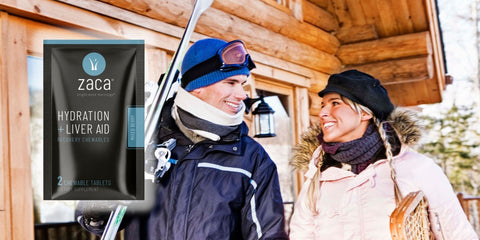What Helps Altitude Sickness In Colorado?

Altitude sickness in Colorado is a common problem for tourists. With everything that can go wrong in a trip, altitude sickness is often overlooked. Learning the symptoms and what helps altitude sickness in Colorado it will keep a holiday from turning into a nightmare.
Altitude Sickness in Colorado
Colorado is a state known for its beautiful mountains and natural scenery. When you go to a place with a higher altitude, like Colorado, your body needs time to adjust to the change. The air at higher altitudes contains less oxygen than the air at lower altitudes.
Altitude sickness (acute mountain sickness) is a condition that can affect people when they travel to areas of high altitude (usually over 8000 feet above sea level) too quickly. It happens most commonly in Colorado where many of the destinations are located at elevations over 8000 feet, but can happen as low as 5000 feet similar to Denver's altitude (5280 feet).
Some popular mountain destinations throughout Colorado with higher risk of more severe altitude sickness include Telluride at 8420 feet, Vail at 8150 feet, Breckenridge at 9600 feet, Aspen at 7908 feet, and Copper Mountain at 9700 feet.
Here are some of the common symptoms of altitude sickness :
- Headache
- Dizziness
- Fatigue
- Nausea or vomiting
- Difficulty breathing
-
Sleeping issues or insomnia
It's best be prepared before your Colorado trip to help avoid altitude sickness.
What Helps Altitude Sickness in Colorado
The symptoms of altitude sickness in Colorado are no joke. If you’re not careful, your vacation can quickly turn into a miserable experience. Fortunately if you're wondering what helps altitude sickness in Colorado, there are several ways to help prevent and treat altitude sickness.
Here are three ways that you can help prevent altitude sickness in Colorado:
1. Drink plenty of water.
Dehydration is a common problem in high altitudes and can lead to an increase in altitude sickness symptoms. Drink water even if you do not feel thirsty. And avoid alcohol and other caffeinated drinks that can dehydrate you.
The standard recommendation is drink half your weight in water. However, the exact amount you need can vary based on factors like your activity level and the weather. The air is much dryer in Colorado, which causes more water loss than usual. It's better safe than sorry to drink extra water throughout your trip.
To boost your hydration, stock up on Zaca's hydration packets that enhance electrolyte and water intake.
2. Get plenty of rest.
The best way to avoid Colorado altitude sickness is to take it easy for a few days as your body adjusts and acclimates. You will be more susceptible to the effects of altitude sickness if you do not get enough rest.
Limit your physical activity, especially for the first few days at altitude. If you must exercise, start with light activities and increase them gradually.
Also get enough sleep. You may find that you need more sleep than usual during your first few nights in a high-altitude destination until your body adjusts.
A lot of Colorado visitors will spend a night in Denver at 5280 feet in elevation to help acclimate the body before heading to the higher altitude destinations such as Vail at 8150 feet in elevation.
2. Take supplements for altitude sickness.
In our research we've found two natural ingredients showing significant benefits to altitude sickness. These two ingredients are:
-
Glutathione - Glutathione, a naturally occurring antioxidant in the body, may help offset the effects of altitude sickness. One study shows glutathione decreases up to 45% when exposed to high altitudes, therefore supplementing it will help restore it and fight off high altitude oxidative damage.
-
Dihydromyricetin (DHM) - Dihydromyricetin, a flavonoid from the prized Hovenia Dulcis extract, was proven in 2014 to improve physical performance in high altitude conditions. Supplementing Dihydromyricetin is a great way to boost your body under altitude stress.
The synergy of Glutathione and Dihydromyricetin is one of the best combinations in supplements for altitude sickness.
Top Local Pick Altitude Supplement

Looking for a simple way to help combat the effects of high altitude? The next time you’re headed to a Colorado mountain getaway, bring Zaca chewables to help you feel better faster. Including both Glutathione and Dihydromyricetin, Zaca chewables are specifically designed to help combat the high altitude oxidative stress so you can have a better mountain experience. The chewable tablets are delicious, small, and conveniently packaged for carrying on-the-go.
Gives your body what it needs to function at peak levels and try Zaca chewable tablets for your next trip!
SOURCES
1. Effect of high altitude (7,620 m) exposure on glutathione
https://pubmed.ncbi.nlm.nih.gov/11320641/
2. Dihydromyricetin Improves Physical Performance under Simulated High Altitude
https://journals.lww.com/acsm-msse/fulltext/2014/11000/Dihydromyricetin_Improves_Physical_Performance.6.aspx

